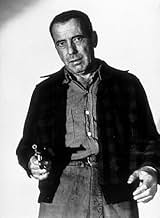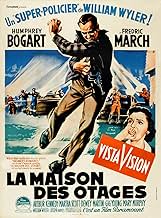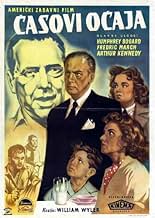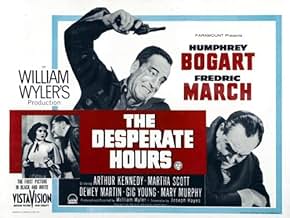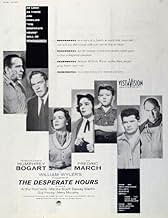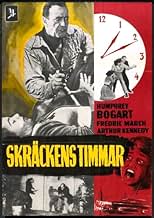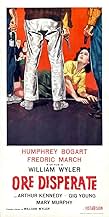AVALIAÇÃO DA IMDb
7,4/10
11 mil
SUA AVALIAÇÃO
Adicionar um enredo no seu idiomaThree escaped convicts move in on and terrorize a suburban household.Three escaped convicts move in on and terrorize a suburban household.Three escaped convicts move in on and terrorize a suburban household.
- Direção
- Roteiristas
- Artistas
- Prêmios
- 2 vitórias e 1 indicação no total
Walter Baldwin
- George Patterson
- (não creditado)
John Benson
- Bellboy
- (não creditado)
Paul E. Burns
- Chef at Al's Dining Room
- (não creditado)
Edmund Cobb
- Mr. Walling
- (não creditado)
Avaliações em destaque
The adaptation to the screen of Joseph Hayes' play by Mr. Hayes, himself, is given an excellent treatment by William Wyler, one of the great film directors of all times. The play was claustrophobic; there is little to be done in opening it and at times it feels as though we are in the theater watching the drama unfolds. Instead of detracting from it, this atmosphere contributes to the drama we are watching.
This film juxtaposes good and evil. We have the Hilliard household, which could be the set from anyone of the sitcoms of late 50s TV. There is the father figure, the decent Dan who is happily married to Eleonor and they have two children that seem to be their pride and joy.
Into this house a trio of escaped convicts arrive; they are ruthless. Led by Glenn Griffin, these desperate men bring panic to the Hilliards, who become paralyzed by the harm they might encounter at the hands of the criminals.
This film is a tribute to the great acting of Humphrey Bogart and Frederick March. Their characters are well defined and both actors play extremely well together. Mr. March was an accomplished actor of both the theater and the screen. Mr. Bogart holds his own against his co-star in a show of wills, unrivaled in any of the films of the 50s.
The cast assembled was first rate. Under Wyler's direction they give detailed performances. Martha Scott, Arthur Kennedy, Gig Young, Dewey Martin, among others, shine in this movie.
This film juxtaposes good and evil. We have the Hilliard household, which could be the set from anyone of the sitcoms of late 50s TV. There is the father figure, the decent Dan who is happily married to Eleonor and they have two children that seem to be their pride and joy.
Into this house a trio of escaped convicts arrive; they are ruthless. Led by Glenn Griffin, these desperate men bring panic to the Hilliards, who become paralyzed by the harm they might encounter at the hands of the criminals.
This film is a tribute to the great acting of Humphrey Bogart and Frederick March. Their characters are well defined and both actors play extremely well together. Mr. March was an accomplished actor of both the theater and the screen. Mr. Bogart holds his own against his co-star in a show of wills, unrivaled in any of the films of the 50s.
The cast assembled was first rate. Under Wyler's direction they give detailed performances. Martha Scott, Arthur Kennedy, Gig Young, Dewey Martin, among others, shine in this movie.
Humphrey Bogart got his first real notice on the silver screen in The Petrified Forest, repeating a role he did on Broadway. As Duke Mantee, criminal on the run, he held the occupants of a diner hostage for several hours.
Here in The Desperate Hours, Bogey takes over a role that Paul Newman originated on Broadway. Bogart, Dewey Martin and Robert Middleton play three escaped convicts who drive to Indianapolis because Bogart wants to kill the officer that arrested him. Dewey Martin is Bogart's younger brother and Robert Middleton is their brutal partner in the escape.
Given the age difference between Bogart and Paul Newman, I'm sure the role of Glenn Griffin was played quite differently by Newman on stage. Similarly Karl Malden played Dan Hilliard on stage and Fredric March plays him for the screen. March is no hero here, he's just an ordinary family man trapped with his family in a terrible situation.
Rounding out the Hilliard family is wife Martha Scott, daughter Mary Murphy and son Richard Eyer. Martha Scott had appeared with March before as his wife in One Foot in Heaven. She does well here also, but I do wonder where the real Mrs. March was, Florence Eldridge. It seems like a good joint project for both of them.
The Desperate Hours is a good suspenseful thriller that will keep you glued to your seat. These are real people here, not some Hollywood type situation comedy family. You will care about what the eventual outcome will be.
Here in The Desperate Hours, Bogey takes over a role that Paul Newman originated on Broadway. Bogart, Dewey Martin and Robert Middleton play three escaped convicts who drive to Indianapolis because Bogart wants to kill the officer that arrested him. Dewey Martin is Bogart's younger brother and Robert Middleton is their brutal partner in the escape.
Given the age difference between Bogart and Paul Newman, I'm sure the role of Glenn Griffin was played quite differently by Newman on stage. Similarly Karl Malden played Dan Hilliard on stage and Fredric March plays him for the screen. March is no hero here, he's just an ordinary family man trapped with his family in a terrible situation.
Rounding out the Hilliard family is wife Martha Scott, daughter Mary Murphy and son Richard Eyer. Martha Scott had appeared with March before as his wife in One Foot in Heaven. She does well here also, but I do wonder where the real Mrs. March was, Florence Eldridge. It seems like a good joint project for both of them.
The Desperate Hours is a good suspenseful thriller that will keep you glued to your seat. These are real people here, not some Hollywood type situation comedy family. You will care about what the eventual outcome will be.
These are the times when danger looks us in the face, when terror, torment, tyranny lends an embrace, as all we cherish and endear, goes toe to toe with every fear, and the world that was secure, falls out of place. When every movement of the clock is an attack, facades of life engraved with fractures, widened cracks - tremors, trembles, quaking dread, in not too long, you might be dead, as the desperation reaches, a climax.
It's of its time but it does still stand up to be counted all these years later, with superb performances throughout, especially HB, who as an actor matured with magnificence in the latter years of his movie making career.
It's of its time but it does still stand up to be counted all these years later, with superb performances throughout, especially HB, who as an actor matured with magnificence in the latter years of his movie making career.
A lot of loopy comments out there about this one. "Predictable" is a very over-used adjective that I've certainly been guilty of myself, but what exactly is supposed to happen in a hostage-taking, domestic thriller like this? Are aliens supposed to land in the Hilliards' back yard and vaporize everyone? Is Bogart's escaped con supposed to dress up in drag at some point and decide he wants to become a chorus girl? Would that satisfy those who find this movie predictable?
"The Desperate Hours" keeps you on the edge of your seat; it more than passes the test as a thriller and it most certainly has not mellowed over time. The script is fine, intelligently examining how the respectably middle class but somewhat complacent father (Frederic March) draws strength and courage from the love of his wife and kids in handling the ordeal. Though each family member is formulating their own strategy for how best to resolve the crisis (their brains are always going "clickity-clickity-click" as Bogart mockingly keeps reminding them) they recognize March as the father and as such the captain of the ship. They look to him for leadership and he responds. It's telling that when the young son disobediently puts his ill-conceived plan into action, it undermines the father's nearly successful tactic. Though he had earlier suspected his dad of being cowardly for not taking a more aggressive stance, from this point on he begins to appreciate all the variables he must take into account and looks up to him once more. The idealized, but by no means wildly unrealistic domestic situation reflects the mood of the time. Why on earth would it possibly reflect cynically 90's attitudes and sensibilities, as some reviewers seem to desire?
There are casting decisions pertaining to age differences which raise an eyebrow, but do not seriously detract from William Wyler's (as masterful and dependable a director as Hollywood has ever cranked out) otherwise polished production. At 42 of course, Gig Young seems a tad old for the family's 19 year old daughter (beautiful Mary Murphy) but he's still youthful enough looking and he puts an interesting spin on what is usually the thankless role of the boyfriend who stumbles into things. One of the beauties of B&W photography is that it can always be used to make actors look as many as 5-15 years younger than they are. This comes into play with Bogart's character as well, as he's asked to be the older brother of 32 year old Dewey Martin, and it's something that I didn't have too hard a time buying. It's difficult to believe this was one of his last films, as he seems quite vigorous and robust in the part.
Tense, exciting, well-acted and directed; this is indisputably far superior to Michael Cimino's bloody and botched 1990 Mickey Rourke "star" vehicle remake.
"The Desperate Hours" keeps you on the edge of your seat; it more than passes the test as a thriller and it most certainly has not mellowed over time. The script is fine, intelligently examining how the respectably middle class but somewhat complacent father (Frederic March) draws strength and courage from the love of his wife and kids in handling the ordeal. Though each family member is formulating their own strategy for how best to resolve the crisis (their brains are always going "clickity-clickity-click" as Bogart mockingly keeps reminding them) they recognize March as the father and as such the captain of the ship. They look to him for leadership and he responds. It's telling that when the young son disobediently puts his ill-conceived plan into action, it undermines the father's nearly successful tactic. Though he had earlier suspected his dad of being cowardly for not taking a more aggressive stance, from this point on he begins to appreciate all the variables he must take into account and looks up to him once more. The idealized, but by no means wildly unrealistic domestic situation reflects the mood of the time. Why on earth would it possibly reflect cynically 90's attitudes and sensibilities, as some reviewers seem to desire?
There are casting decisions pertaining to age differences which raise an eyebrow, but do not seriously detract from William Wyler's (as masterful and dependable a director as Hollywood has ever cranked out) otherwise polished production. At 42 of course, Gig Young seems a tad old for the family's 19 year old daughter (beautiful Mary Murphy) but he's still youthful enough looking and he puts an interesting spin on what is usually the thankless role of the boyfriend who stumbles into things. One of the beauties of B&W photography is that it can always be used to make actors look as many as 5-15 years younger than they are. This comes into play with Bogart's character as well, as he's asked to be the older brother of 32 year old Dewey Martin, and it's something that I didn't have too hard a time buying. It's difficult to believe this was one of his last films, as he seems quite vigorous and robust in the part.
Tense, exciting, well-acted and directed; this is indisputably far superior to Michael Cimino's bloody and botched 1990 Mickey Rourke "star" vehicle remake.
Frederic March, Martha Scott, Humphrey Bogart and Arthur Kennedy are just a few of the people who endure "The Desperate Hours," a 1955 film, based on the stage play and directed by William Wyler. On Broadway, the play was directed by Robert Montgomery and starred Karl Malden in the Bogart role and Paul Newman played his brother, here played by Dewey Martin. The film also stars Gig Young, Mary Murphy, Richard Eyer, and Robert Middleton.
Having just seen Bogart in the 1936 "The Petrified Forest," it was interesting to see him still taking hostages 19 years later - and in fact, looking like he'd spent the last 19 years on the run from the law. He was clearly ill during the making of this film. Though Dewey Martin looked 30 years younger than Bogie, he was in fact only 20, making the fact that they were brothers a tiny bit more plausible.
I also had recently seen "The Star Witness," a 1931 Warner Brothers film with a similar plot, which won an Oscar for best original screenplay. By 1955, it wasn't original any longer, but the execution of the story is compelling. Martha Scott is a housewife, Ellie Hilliard, alone in her suburban home when three escaped criminals (Bogart, Martin and Middleton) take over the place. Glenn Griffin (Bogart) wants to murder the Deputy Sheriff (Arthur Kennedy) who put him in prison, and he needs to wait for the delivery of some money to make good his escape. Dan Hilliard (March) and his daughter Cynthia (Murphy) walk into the situation, followed later by the Hilliard's little boy (Eyer). You'll be wondering why the son isn't knocked off - by his parents - given the trouble he causes.
The money is delayed, and of course, the police have no idea where the gang is, as Griffin has put his car in the Hilliard garage. So the hours turn into overnight. Although March and Cynthia are allowed to leave the house for work, and Cynthia has to keep a date with her boyfriend (Young), they're too terrified to say anything for fear the mother and boy will be killed. Basically the gang as well and the family become prisoners as the hours drag on.
Wyler gives us lots of frightening and suspenseful moments as the tension builds in the house, and he never lets the pace drag. Supposedly he made March and Scott do a goodbye scene for take after take because he thought March was "acting" and wanted to tire him out. An accomplished stage actor of the old school, March consistently had a great presence but didn't always emotionally connect with his characters - he does here. March and Bogart make powerful adversaries, March hitting just the right note as an angry father afraid for his family, but not afraid to talk back to Griffin. Bogart's Griffin is shrewd and admires brains and bravery in others; the family impresses him with their guts.
Bogart is marvelous in the role - though tired out, his character is determined to keep the gang together and free; he's resentful of the middle classness of the family and how out of place he and his gang are in a nice home. Unlike his Duke Mantee in "The Petrified Forest", Bogart's Griffin doesn't seem to have a sense of the hopelessness of his situation until the very end; also unlike Duke Mantee, he has a vulnerability that he demonstrates at the end.
Robert Middleton gives a scary performance as a witless member of the gang, and Martin, as Hal, displays Hal's disillusionment with the situation, his attraction to Cynthia, and the realization that he can never have someone like her if he continues down his brother's road. Gig Young is somewhat wasted as Cythia's boyfriend - it's unnecessary star casting. Martha Scott does a terrific job as the harried wife and mother. The wonderful Arthur Kennedy gives another good performance as the sheriff determined to catch Griffin.
Highly recommended for its suspenseful story, fine direction, and top performances.
Having just seen Bogart in the 1936 "The Petrified Forest," it was interesting to see him still taking hostages 19 years later - and in fact, looking like he'd spent the last 19 years on the run from the law. He was clearly ill during the making of this film. Though Dewey Martin looked 30 years younger than Bogie, he was in fact only 20, making the fact that they were brothers a tiny bit more plausible.
I also had recently seen "The Star Witness," a 1931 Warner Brothers film with a similar plot, which won an Oscar for best original screenplay. By 1955, it wasn't original any longer, but the execution of the story is compelling. Martha Scott is a housewife, Ellie Hilliard, alone in her suburban home when three escaped criminals (Bogart, Martin and Middleton) take over the place. Glenn Griffin (Bogart) wants to murder the Deputy Sheriff (Arthur Kennedy) who put him in prison, and he needs to wait for the delivery of some money to make good his escape. Dan Hilliard (March) and his daughter Cynthia (Murphy) walk into the situation, followed later by the Hilliard's little boy (Eyer). You'll be wondering why the son isn't knocked off - by his parents - given the trouble he causes.
The money is delayed, and of course, the police have no idea where the gang is, as Griffin has put his car in the Hilliard garage. So the hours turn into overnight. Although March and Cynthia are allowed to leave the house for work, and Cynthia has to keep a date with her boyfriend (Young), they're too terrified to say anything for fear the mother and boy will be killed. Basically the gang as well and the family become prisoners as the hours drag on.
Wyler gives us lots of frightening and suspenseful moments as the tension builds in the house, and he never lets the pace drag. Supposedly he made March and Scott do a goodbye scene for take after take because he thought March was "acting" and wanted to tire him out. An accomplished stage actor of the old school, March consistently had a great presence but didn't always emotionally connect with his characters - he does here. March and Bogart make powerful adversaries, March hitting just the right note as an angry father afraid for his family, but not afraid to talk back to Griffin. Bogart's Griffin is shrewd and admires brains and bravery in others; the family impresses him with their guts.
Bogart is marvelous in the role - though tired out, his character is determined to keep the gang together and free; he's resentful of the middle classness of the family and how out of place he and his gang are in a nice home. Unlike his Duke Mantee in "The Petrified Forest", Bogart's Griffin doesn't seem to have a sense of the hopelessness of his situation until the very end; also unlike Duke Mantee, he has a vulnerability that he demonstrates at the end.
Robert Middleton gives a scary performance as a witless member of the gang, and Martin, as Hal, displays Hal's disillusionment with the situation, his attraction to Cynthia, and the realization that he can never have someone like her if he continues down his brother's road. Gig Young is somewhat wasted as Cythia's boyfriend - it's unnecessary star casting. Martha Scott does a terrific job as the harried wife and mother. The wonderful Arthur Kennedy gives another good performance as the sheriff determined to catch Griffin.
Highly recommended for its suspenseful story, fine direction, and top performances.
Você sabia?
- CuriosidadesThe character of Glenn Griffin was made older so Humphrey Bogart could play the role. The stage version starred Karl Malden and a young Paul Newman in the Bogart role.
- Erros de gravaçãoBefore Glenn asks Eleanor if she could make a phone call without crying, he puts his left hand in his pocket. When she stands up and walks to the phone, he puts the same hand in the pocket again.
- Citações
[first lines]
[the morning newspaper hits the front door]
Ellie Hilliard: I'll get it, darling.
Daniel Hilliard: [about the newspaper boy's routine of always hitting the front door with the newspaper] Some morning I'm gonna catch up with that kid.
Principais escolhas
Faça login para avaliar e ver a lista de recomendações personalizadas
- How long is The Desperate Hours?Fornecido pela Alexa
Detalhes
- Data de lançamento
- País de origem
- Idioma
- Também conhecido como
- The Desperate Hours
- Locações de filme
- Empresa de produção
- Consulte mais créditos da empresa na IMDbPro
Bilheteria
- Orçamento
- US$ 2.388.000 (estimativa)
- Tempo de duração1 hora 52 minutos
- Cor
- Proporção
- 1.37 : 1(original ratio)
Contribua para esta página
Sugerir uma alteração ou adicionar conteúdo ausente


